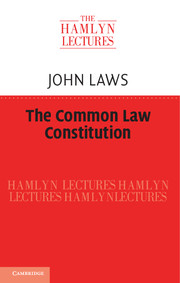Lecture III - The Common Law and Europe
Published online by Cambridge University Press: 05 August 2014
Summary
‘But when we come to matters with a European element, the Treaty is like an incoming tide. It flows into the estuaries and up the rivers. It cannot be held back. Parliament has decreed that the Treaty is henceforward to be part of our law. It is equal in force to any statute.’ This was Lord Denning’s metaphor for the arrival in our books of Community law. The citation is from Bulmer v. Bollinger, a celebrated case at the time. It was about the protection of the designation ‘champagne’ under what is of course now EU law. Judgment was delivered only sixteen months after the United Kingdom acceded to what was then known as the Common Market in January 1973.
In Lecture I, I described the constitutional balance between law and government, between judicial and political power. The constitutional balance has evolved through the benign force of our constitution’s unifying principle, the common law. The common law’s distinctive method has yielded a process of continuous self-correction, allowing for the refinement of principle over time; it is the crucible of the moderate and orderly development of state power. This benign continuum of developing law has been the means by which legislature and government are allowed efficacy but forbidden oppression. But I also said that there were two contemporary threats to the constitutional balance. The first is produced by present-day fears, both real and imagined, of the malice of extremism. That was the subject of Lecture II. The second threat is the subject of this Lecture. It is that the actual or perceived effects of law made in Europe upon our domestic system may undermine virtues of the common law: its catholicity and its restraint. Lord Denning’s metaphor about the estuaries and the rivers, whether or not he meant it so, thus has a whiff of apprehension about it. It may serve as a very superficial shorthand for the concerns I will expose and confront.
- Type
- Chapter
- Information
- The Common Law Constitution , pp. 57 - 86Publisher: Cambridge University PressPrint publication year: 2014



